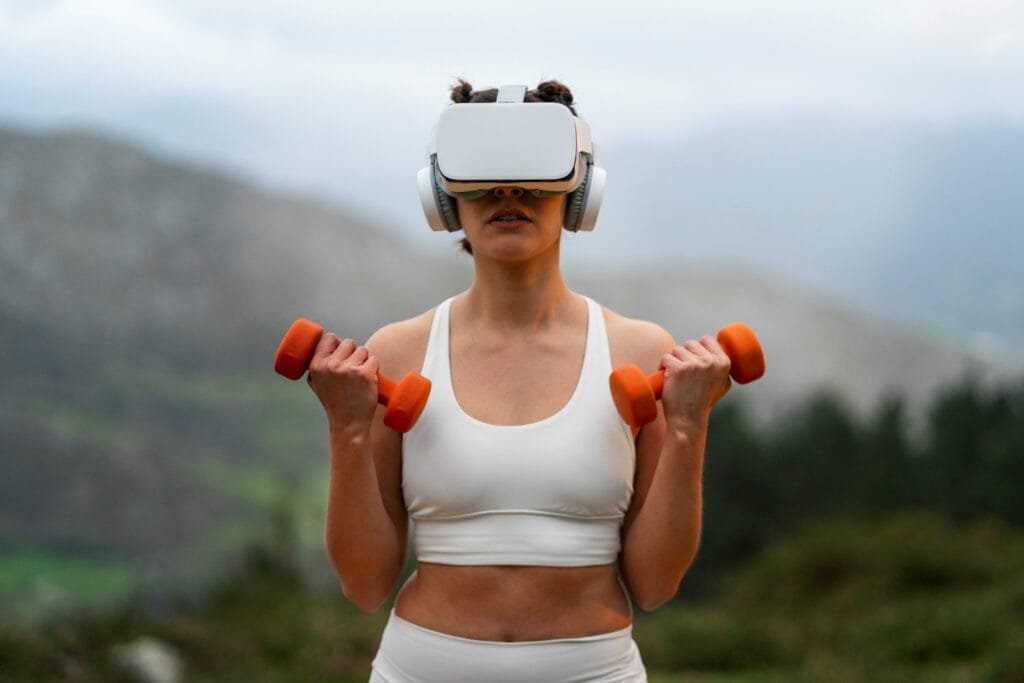AI-Powered Workouts: How Technology is Personalizing Fitness Routines in 2025
In recent years, the fitness industry has witnessed a transformative shift with the integration of artificial intelligence (AI) into workout routines. As we step into 2025, AI-powered workouts are becoming more accessible, personalized, and effective than ever before. Whether you’re a beginner looking to shed a few pounds or a seasoned athlete aiming to fine-tune your performance, AI is changing the way we approach fitness.
The Rise of AI in Fitness (AI-Powered Workouts)

Artificial intelligence has been gradually making its way into the fitness industry, but the last couple of years have seen a significant leap. From smartwatches that track heart rate and calorie burn to apps that provide real-time feedback based on your movements, AI is enhancing the overall workout experience. What makes AI in fitness so revolutionary is its ability to offer a customized approach that was once only available through personal trainers.
Unlike generic workout plans, AI-powered platforms use advanced algorithms to analyze your body type, fitness level, goals, and even preferences. This data-driven approach ensures that your fitness plan is uniquely yours, adapting as you progress.
Personalization Like Never Before

One of the standout features of AI-powered workouts is personalization. Traditional workout plans often follow a one-size-fits-all approach, which may not yield the best results for everyone. AI changes this by continuously learning from your performance and adjusting your regimen accordingly.
For example, apps like Freeletics and Fitbod are leveraging AI to provide tailored workout plans that adapt to your strengths and weaknesses. If the system detects that you’re excelling in endurance but struggling with strength, it will automatically adjust the intensity and type of exercises to balance your training.
This dynamic approach doesn’t just enhance results; it also keeps you motivated. After all, nothing kills motivation faster than feeling stuck on a plateau. With AI’s ability to offer just the right amount of challenge, users are finding themselves breaking barriers they once thought were impossible.
Real-Time Feedback and Injury Prevention

Another game-changing aspect of AI in fitness is its ability to provide real-time feedback. Through motion tracking and computer vision, AI-powered apps and devices can assess your form and technique, highlighting areas for improvement instantly.
For instance, Tempo and Mirror are popular platforms using AI to monitor users’ movements and provide corrective guidance on the spot. This real-time feedback not only enhances efficiency but also plays a critical role in injury prevention. By identifying poor posture or incorrect form, AI helps users avoid strains, sprains, and other common workout injuries.
Moreover, injury recovery has also seen advancements thanks to AI. Customized rehab programs that adjust as you heal are becoming more common, ensuring a safer and more effective recovery process.
AI and Wearable Tech: A Match Made in Fitness Heaven

Wearable technology continues to evolve, with AI enhancing its capabilities even further. Devices like Fitbit, Apple Watch, and Whoop are no longer just fitness trackers; they are sophisticated AI-powered tools that provide deep insights into your health and fitness.
These wearables can now monitor sleep quality, heart rate variability, oxygen saturation, and even stress levels. By analyzing this data, AI-powered platforms can suggest tailored workout plans that align with your body’s readiness, ensuring you’re training effectively without overexertion.
Furthermore, these insights can be shared with trainers or healthcare providers, offering a more comprehensive approach to fitness and well-being.
Motivation Through Gamification

Another fascinating aspect of AI-powered workouts is the integration of gamification. Companies like Zwift and Peloton have been using AI to create immersive, game-like experiences that keep users engaged and motivated.
By setting personalized challenges, offering rewards, and enabling social interactions, AI-driven platforms are making workouts more enjoyable. This blend of technology and entertainment is particularly appealing to those who struggle with traditional exercise routines.
The Future of AI-Powered Workouts
As AI technology continues to evolve, its impact on fitness is only expected to grow. From predictive analytics that anticipate your progress to virtual trainers that can assess your performance with uncanny accuracy, the possibilities are endless.
However, it’s important to note that while AI offers incredible benefits, it’s not a complete replacement for human trainers or medical professionals. Instead, it acts as a powerful tool that complements and enhances the fitness journey.
AI-powered workouts are reshaping the fitness landscape in 2025, providing unprecedented levels of personalization, efficiency, and motivation. By leveraging AI, individuals are now able to achieve their fitness goals in a way that feels uniquely tailored to them. As technology continues to advance, the future of fitness looks brighter and more innovative than ever.
Whether you’re a fitness enthusiast or someone just beginning their journey, embracing AI-powered workouts could be the key to unlocking your full potential.

